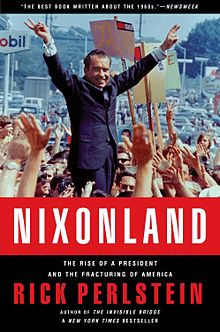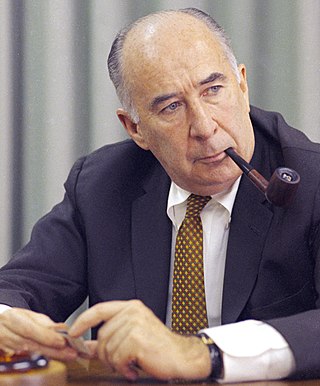
John Newton Mitchell was the 67th Attorney General of the United States, serving under President Richard Nixon and was chairman of Nixon's 1968 and 1972 presidential campaigns. Prior to that, he had been a municipal bond lawyer and one of Nixon's associates. He was tried and convicted as a result of his involvement in the Watergate scandal.
The silent majority is an unspecified large group of people in a country or group who do not express their opinions publicly. The term was popularized by U.S. President Richard Nixon in a televised address on November 3, 1969, in which he said, "And so tonight—to you, the great silent majority of my fellow Americans—I ask for your support." In this usage it referred to those Americans who did not join in the large demonstrations against the Vietnam War at the time, who did not join in the counterculture, and who did not participate in public discourse. Nixon, along with many others, saw this group of Middle Americans as being overshadowed in the media by the more vocal minority.

Clark MacGregor was an American politician and Republican U.S. Representative from Minnesota's 3rd Congressional District for five terms from 1961 to 1971.

William Roy DeWitt Wallace, publishing as DeWitt Wallace, was an American magazine publisher.
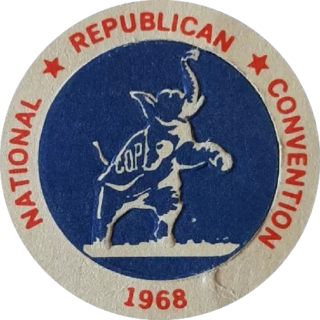
The 1968 Republican National Convention was held at the Miami Beach Convention Center in Miami Beach, Dade County, Florida, USA, from August 5 to August 8, 1968, to select the party's nominee in the general election. It nominated former Vice President Richard Nixon for president and Maryland Governor Spiro Agnew for vice president. It was the fourth time Nixon had been nominated on the Republican ticket as either its vice presidential or presidential candidate (1960). Symbolic of the South's changing political affiliation, this was the first Republican National Convention held in a prior Confederate State.

Garry Wills is an American author, journalist, political philosopher, and historian, specializing in American history, politics, and religion, especially the history of the Catholic Church. He won a Pulitzer Prize for General Non-Fiction in 1993.

Rick Perlstein is an American historian and journalist who has garnered recognition for his chronicles of the post-1960s American conservative movement. The author of five bestselling books, Perlstein received the 2001 Los Angeles Times Book Prize for his first book, Before the Storm: Barry Goldwater and the Unmaking of the American Consensus. Politico has dubbed him "a chronicler extraordinaire of modern conservatism."
The Constantian Society was a political group in the United States devoted to promoting the system of constitutional monarchy as a superior form of government. It was founded in 1970. The official publication of the Constantian Society was The Constantian; Journal of the Constantian Society. Randall J. Dicks was the founder of the society.
These are the references for further information regarding the history of the Republican Party in the U.S. since 1854.

The Fifth Party System, also known as the New Deal Party System, is the era of American national politics that began with the election of Franklin D. Roosevelt to President of the United States in 1932. Roosevelt's implementation of his popular New Deal expanded the size and power of the federal government to an extent unprecedented in American history, and marked the beginning of political dominance by the Democratic Party that would remain largely unbroken until 1952. This period also began the ideological swapping of Democrats and Republicans into their modern versions. This was largely due to traditionally Republican Black voters switching to the Democratic Party, while conservative, White, and southern Democrats shifted to the Republican Party. This occurred as Democrats began increasingly prioritizing civil rights, a process that accelerated into the 1960s. The Fifth Party System followed the Fourth Party System, also known as the Progressive Era, and was succeeded by the Sixth Party System.
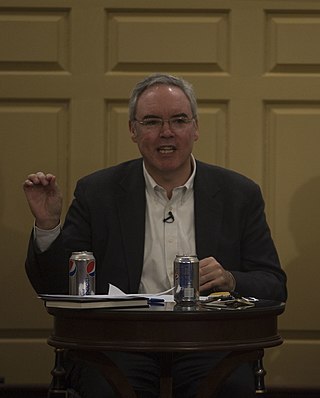
Thomas J. Sugrue is an American historian of the 20th-century United States currently serving as a professor at New York University. From 1991 to 2015, he was the David Boies Professor of History and Sociology at the University of Pennsylvania and founding director of the Penn Social Science and Policy Forum. His areas of expertise include American urban history, American political history, housing and the history of race relations. He has published extensively on the history of liberalism and conservatism, on housing and real estate, on poverty and public policy, on civil rights, and on the history of affirmative action.
This bibliography of Richard Nixon includes publications by Richard Nixon, the 37th president of the United States, and books and scholarly articles about him and his policies.
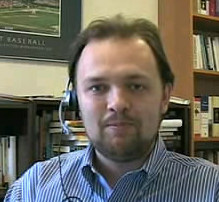
Ross Gregory Douthat is an American political analyst, blogger, author and New York Times columnist. He was a senior editor of The Atlantic. He has written on a variety of topics, including the state of Christianity in America and "sustainable decadence" in contemporary society.
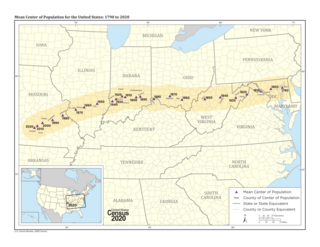
In the culture of the United States, the idea of Southernization came from the observation that Southern values and beliefs had become more central to political success, reaching an apogee in the 1990s, with a Democratic President and Vice President from the South and Congressional leaders in both parties being from the South. Some commentators said that Southern values seemed increasingly important in national elections through the early 21st century. American journalists in the late 2000s used the term "Southernization" to describe the political and cultural effects.

The 1966 United States Senate election in Illinois took place on November 8, 1966. Incumbent Democratic United States Senator Paul Douglas, seeking a fourth term in the United States Senate, faced off against Republican Charles H. Percy, a businessman and the 1964 Republican nominee for Governor of Illinois. A competitive election ensued, featuring campaign appearances by former vice president Richard M. Nixon on behalf of Percy. Ultimately, Percy ended up defeating Senator Douglas by a fairly wide margin, allowing him to win what would be the first of three terms in the Senate.
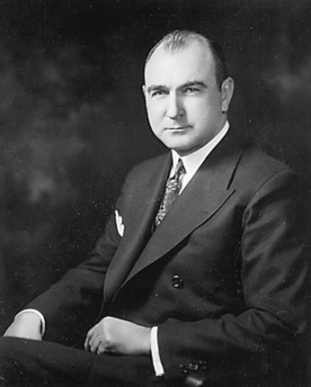
Lemuel Ricketts Boulware was General Electric's vice president of labor and community relations from 1956 until 1961. Boulware's business tutelage and political cultivation of Ronald Reagan from 1954 to 1962 while Reagan was a spokesman for the company is argued to have led to Reagan's conversion from New Deal-style liberalism to Barry Goldwater-style conservatism.

Woodstock West is the name University of Denver students gave to the shanty village that they built while protesting the school's decision to stay open after the Kent State shootings.

Harry Shuler Dent Sr. was an American political strategist considered one of the architects of the Republican Southern Strategy. One of the South's leading power brokers, he was instrumental in securing the votes to get Richard Nixon nominated for President at the 1968 Republican National Convention. He was the father of the financial prognosticator, Harry S. Dent Jr.

This timeline of modern American conservatism lists important events, developments and occurrences that have affected conservatism in the United States. With the decline of the conservative wing of the Democratic Party after 1960, the movement is most closely associated with the Republican Party (GOP). Economic conservatives favor less government regulation, lower taxes and weaker labor unions while social conservatives focus on moral issues and neoconservatives focus on democracy worldwide. Conservatives generally distrust the United Nations and Europe and apart from the libertarian wing favor a strong military and give enthusiastic support to Israel.

The 1968 United States presidential election in South Carolina took place on November 5, 1968. All 50 states and the District of Columbia were part of the 1968 United States presidential election. South Carolina voters chose 8 electors to the Electoral College, who voted for president and vice president.
